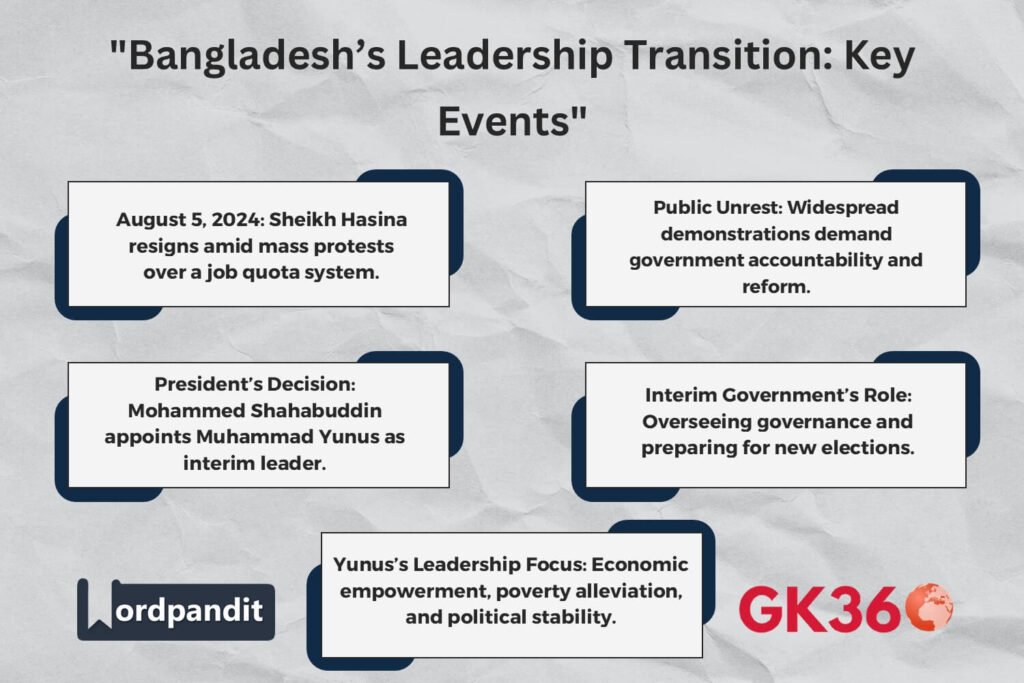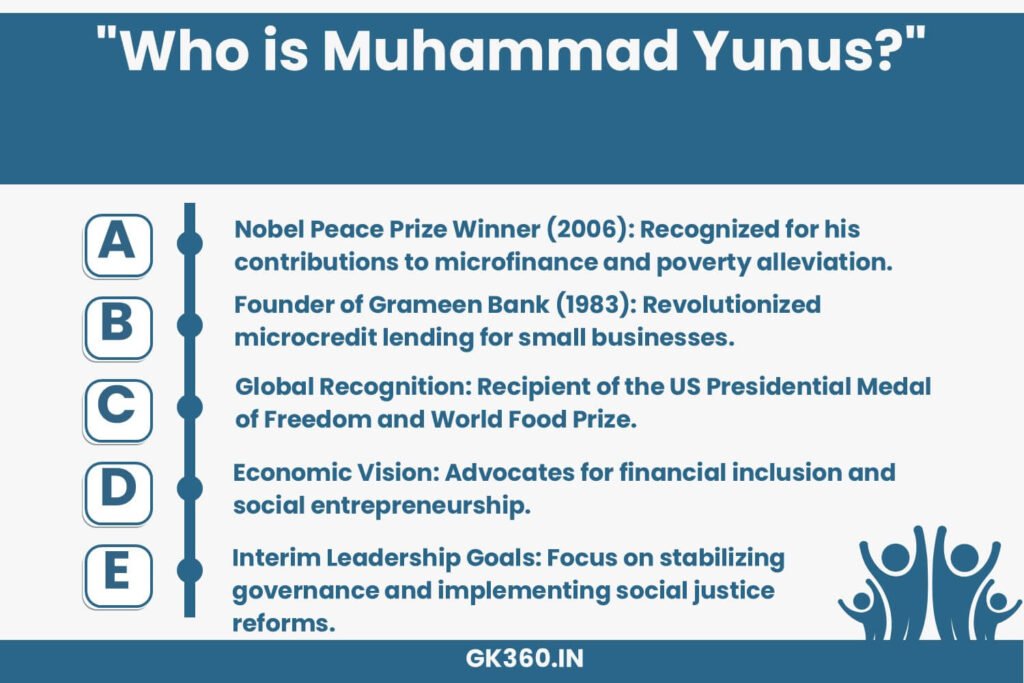Muhammad Yunus Appointed as Head of Bangladesh’s Interim Government
Introduction
In the dynamic world of politics, transitions in leadership often signal significant shifts in governance and policy direction. One such major event occurred when President Mohammed Shahabuddin appointed Nobel laureate Muhammad Yunus as the head of Bangladesh’s interim government. This appointment followed the resignation of Prime Minister Sheikh Hasina on August 5, 2024, amid escalating protests over a controversial job quota system.

This document explores the implications of this political shift, Muhammad Yunus’s background and achievements, and the broader impact on governance and policy-making.
Table of Contents
- The Resignation of Sheikh Hasina: A Turning Point
- Muhammad Yunus: A Profile in Leadership and Innovation
- Awards and Honors: Recognition of a Global Leader
- Strategic Insights: Bangladesh’s Interim Government
- Frequently Asked Questions (FAQ)
- Conclusion: Reflecting on Leadership and Change
The Resignation of Sheikh Hasina: A Turning Point
- Sheikh Hasina Wazed, the longest-serving Prime Minister in Bangladesh’s history, resigned amid significant civil unrest.
- Protests erupted over a controversial job quota system, dividing public opinion and triggering nationwide demonstrations.
- This political shift is crucial for those preparing for competitive exams in current affairs, political science, and general studies.
Key Details to Focus On:
- Sheikh Hasina’s tenure and her contributions to Bangladesh.
- The cause-effect analysis of her resignation and its impact on governance.
- Exam Tip: Use timelines and structured notes to track major political changes.
Muhammad Yunus: A Profile in Leadership and Innovation
- Born on June 28, 1940, in Chittagong, Bangladesh, Muhammad Yunus is a globally recognized social entrepreneur and economist.
- Founder of Grameen Bank (1983) – introducing microcredit as a means to eradicate poverty.
- Advocated the principle that credit is a fundamental human right.
- His innovative financial model has impacted millions in Bangladesh and beyond.
Key Insights:
- Major Contributions: Establishment of Grameen Bank, promotion of microfinance, and Nobel Peace Prize recognition.
- Exam Tip: Relate his economic theories to other developing economies and their poverty alleviation strategies.
Awards and Honors: Recognition of a Global Leader
- Nobel Peace Prize (2006) – Recognized for his efforts in microfinance and anti-poverty campaigns.
- US Presidential Medal of Freedom
- Congressional Gold Medal
- Humanitarian Award (1993, CARE, USA)
- World Food Prize (1994, USA)
- King Hussein Humanitarian Leadership Award (2000)
Exam Strategy:
- Create flashcards for key awards and their recipients to help with quick revision and retention.
Strategic Insights: Bangladesh’s Interim Government
- The formation of an interim government is a crucial concept in governance and political science.
- President Shahabuddin appointed Yunus after consultations with military leaders and representatives from the Anti-Discrimination Student Movement.
- Demonstrates stakeholder influence in political transitions.
Key Concepts to Understand:
- Role of interim governments and their policy-making power.
- How political stakeholders shape national transitions.
- Critical Thinking Exercise: Analyze how Yunus’s economic policies might shape Bangladesh’s governance model.

Frequently Asked Questions (FAQ)
- Why did Sheikh Hasina resign?
Sheikh Hasina resigned due to widespread protests over a controversial job quota system, which led to public unrest and political instability. - Why was Muhammad Yunus chosen as interim head?
Yunus’s global reputation, economic expertise, and neutral stance made him a strong candidate to lead Bangladesh’s transition period. - What is the significance of Grameen Bank?
Grameen Bank’s microcredit model has lifted millions out of poverty by providing small loans to underserved communities. - How does an interim government function?
An interim government is a temporary administration that oversees national governance until new elections are held. - What are the expected policy changes under Yunus’s leadership?
Yunus is likely to prioritize poverty alleviation, social justice, and economic empowerment through financial inclusion and entrepreneurship initiatives.
Conclusion: Reflecting on Leadership and Change
- Political events are not just about dates and figures; they shape a nation’s future governance and policies.
- The appointment of Muhammad Yunus as the interim head of Bangladesh is a historic moment, intertwining leadership with a vision for economic and social transformation.
- Final Exam Tip: Always link current events with their historical context and future policy implications to craft comprehensive exam answers.
Key Takeaways Table
| Aspect | Details |
|---|---|
| Event | Muhammad Yunus appointed as Bangladesh’s interim government head. |
| Date of Appointment | August 5, 2024. |
| Reason for Leadership Change | Sheikh Hasina resigned due to mass protests over a job quota system. |
| President’s Role | Mohammed Shahabuddin selected Yunus for economic expertise and neutrality. |
| Key Achievements of Yunus | Founder of Grameen Bank, Nobel Laureate, economic reform advocate. |
| Interim Government’s Focus | Poverty reduction, social justice, and election preparations. |
| Expected Policy Direction | Strengthening microfinance, fair employment policies, and governance stability. |
SEO-Driven Tags
- Muhammad Yunus Bangladesh Interim Leader
- Sheikh Hasina Resignation 2024
- Bangladesh Political Crisis August 2024
- Nobel Laureate Muhammad Yunus Leadership
- Bangladesh Interim Government Policies
- Grameen Bank Founder in Politics
- Economic Impact of Muhammad Yunus
- Political Transitions in South Asia
- Bangladesh Election News 2024
- Role of Interim Governments in Politics





